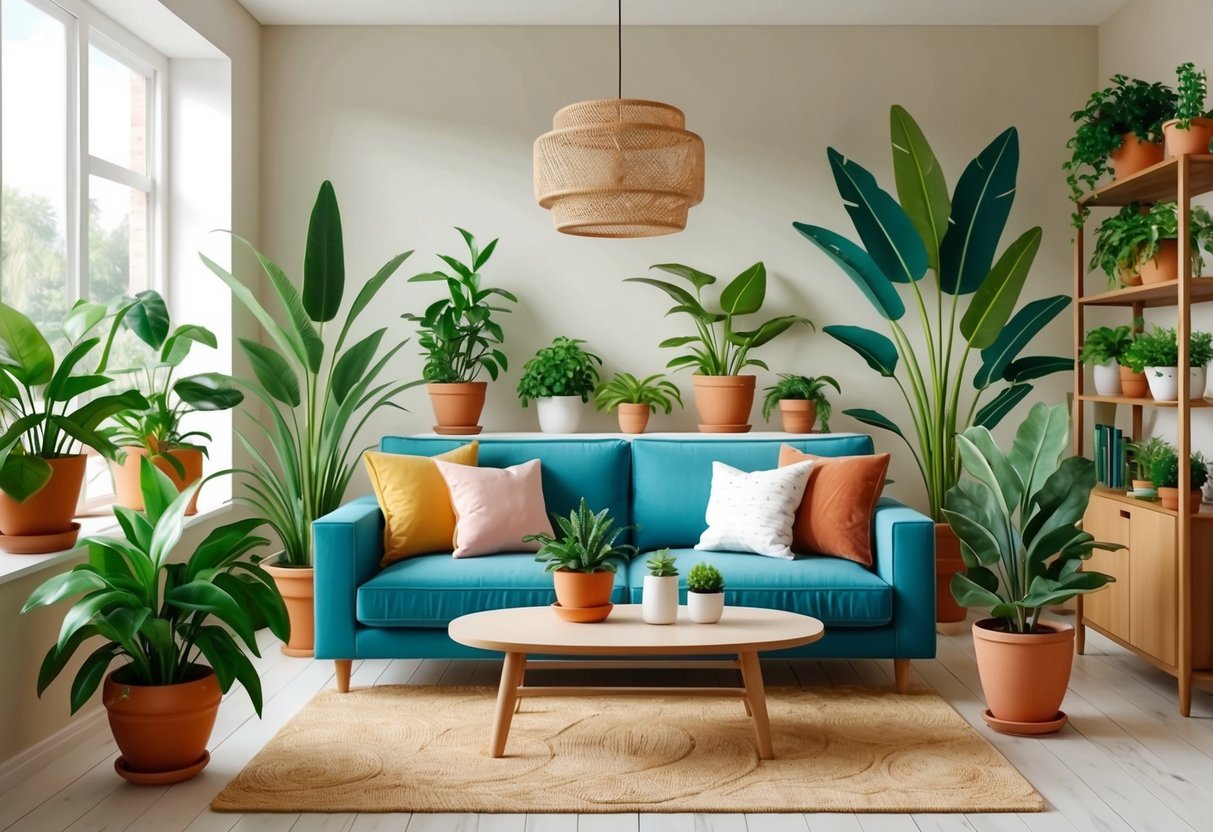
Benefits of Indoor Plants for Mental Health
Indoor plants offer a range of scientifically supported benefits for mental health. They have been shown to improve mood, help people manage stress, and boost focus, especially in environments where air quality and daily routines can affect well-being.
Reduce Stress and Anxiety
Being surrounded by indoor plants can help reduce stress and anxiety. Studies cite that simply viewing greenery can lower blood pressure and calm the nervous system.
Interacting with plants, such as watering or pruning, may further reduce tension by encouraging mindfulness and distraction from daily worries. Specific plants like peace lilies and snake plants are frequently recommended for their low maintenance and calming presence.
Having houseplants nearby creates a more soothing atmosphere that can result in measurable psychological benefits, including reduced feelings of depression and anxiety. Some houseplants, such as lavender or jasmine, are noted for their gentle scents, which can also promote relaxation.
Learn more about these benefits from this overview of the science-backed benefits of indoor plants.
Increase Productivity
The presence of indoor plants in workspaces has been linked to improved productivity, better focus, and stronger mental clarity. Research shows that having greenery nearby can sharpen attention and help people feel more engaged with their tasks.
This is especially relevant for individuals working from home or in offices where distractions are common.
A table summarizing the main effects:
| Benefit | Evidence |
|---|---|
| Improved concentration | Decreased mental fatigue |
| Better work accuracy | More sustained attention |
| Higher productivity | Positive impact on motivation |
Experts suggest placing easy-care plants like pothos or spider plants on desks to boost output. These plants are well-suited for indoor environments and do not require much sunlight, making them ideal for most workspaces.
Check advice from health professionals about plants that boost productivity and focus.
Enhance Wellbeing
Indoor plants contribute to overall wellbeing by fostering a stronger sense of connection to nature. Regular exposure to greenery indoors is associated with improved mood and higher satisfaction with one’s living or working environment.
The act of caring for plants adds structure and routine, which can support emotional balance. Homes filled with houseplants often feel more lively and healthy, partially due to better air quality.
Certain varieties, such as pothos and peace lilies, not only purify indoor air but encourage a sense of purpose and satisfaction when nurtured. The presence of living plants has been linked to decreased feelings of isolation, making them particularly helpful for those spending time alone.
Find recommendations for the best indoor plants for enhancing wellbeing from expert sources.
Recommended Plants for Specific Rooms
Plant selection can make a noticeable difference in air quality, stress reduction, and overall comfort at home. By choosing the right houseplants for each living space, people can support respiratory wellness, ease symptoms such as asthma, and encourage relaxation.
Best Plants for Bedrooms
When considering indoor plants for the bedroom, priority should be given to those that purify air and support better sleep. The snake plant (Sansevieria) and peace lily thrive in low-light conditions and are recognized for their ability to remove pollutants such as formaldehyde and benzene.
Both the snake plant and peace lily can help reduce airborne irritants, which may aid individuals prone to allergies or asthma. English ivy is also highly rated for bedrooms because it can absorb mold spores and other common allergens.
This can make the air cleaner for people with sensitivities who want to improve sleep quality. For ease of comparison, here’s a shortlist of suitable bedroom choices:
- Snake plant – Removes toxins, easy care
- Peace lily – Adds humidity, filters air
- English ivy – Reduces mold, allergy-friendly
More details on the best bedroom-cleaning plants are provided at Transfer Master.
Ideal Bathroom Plants
Bathrooms are humid spaces where plants must tolerate both moisture and fluctuating lighting. Boston fern (Nephrolepis exaltata), spider plant, and peace lily are all well-suited for bathrooms.
Boston ferns excel at removing pollutants and thrive in high humidity, making them a practical option for this space. These ferns also help restore air moisture, offering comfort for those with dry skin or respiratory conditions.
The spider plant can grow in indirect light and is effective at filtering carbon monoxide and other toxins common in indoor air. Peace lily is another strong option for bathrooms, as it flourishes under high humidity and efficiently absorbs airborne mold spores—ideal for locations with less ventilation.
A quick comparison table for bathroom-friendly options:
| Plant | Light Needs | Key Benefits |
|---|---|---|
| Boston fern | Indirect | Purifies, adds humidity |
| Spider plant | Indirect | Air filtration, hardy |
| Peace lily | Low/medium | Absorbs mold, easy upkeep |
Learn more about the best plants for cleaner bathroom air.